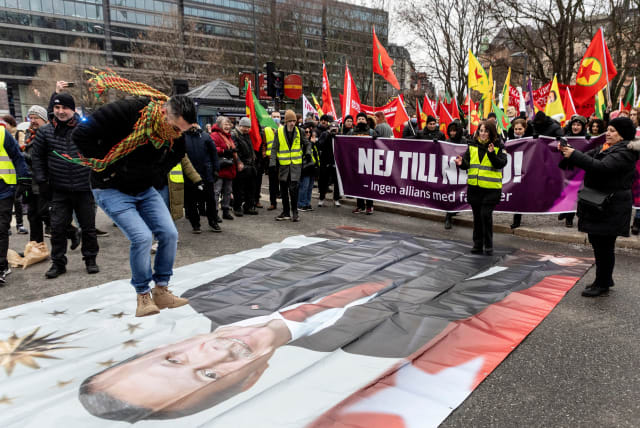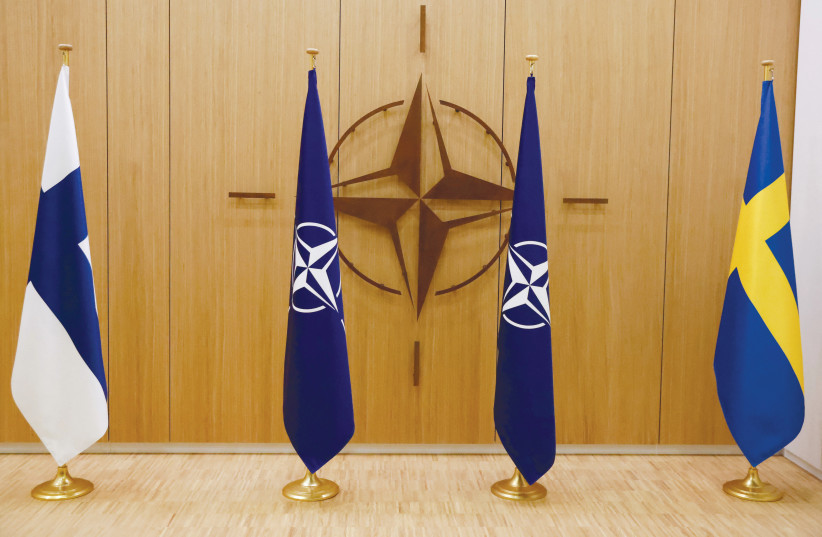Quran burning outside Turkish Embassy in Sweden complicates Swedish bid to join NATO

Turkey is currently blocking Sweden from joining NATO for housing Kurdish groups and the block will likely continue after this incident.
A far-right protest on Saturday outside the Turkish Embassy in Stockholm, during which a Swedish politician burned a copy of the Quran, inflamed tensions between the two countries at a time when Sweden is relying on Turkey for admittance into NATO.
The NATO application
Sweden and Finland, two Nordic countries with traditions of neutrality in the international arena, both requested to join NATO in May 2022, soon after Russia began its invasion of Ukraine. In order for a country to join NATO, the request must be ratified by all 30 members of the alliance. Turkey has vetoed Sweden’s and Finland’s requests to join and demanded that the two countries crack down on certain Kurdish organizations that Turkey considers terrorist groups in order for Turkey to ratify the requests.
When Danish-Swedish political leader Rasmus Paludan, head of the far-right Danish political party Stram Kurs (“Straight Course”), burned a copy of the Quran at the protest on Saturday, the tensions between Stockholm and Ankara came to the fore, sparking rage in Turkey and countries across the Muslim world.
The Turkish Foreign Ministry said in a statement, “We condemn in the strongest possible terms the vile attack on our holy book. … Permitting this anti-Islam act, which targets Muslims and insults our sacred values, under the guise of freedom of expression is completely unacceptable.”
Swedish Prime Minister Ulf Kristersson condemned the act while making clear that the politician who burned the Quran had the constitutional right to do so.
Kristersson wrote on Twitter, “Freedom of expression is a fundamental part of democracy. But what is legal is not necessarily appropriate. Burning books that are holy to many is a deeply disrespectful act. I want to express my sympathy for all Muslims who are offended by what has happened in Stockholm.”
As a reaction to the Swedish authorities allowing the protests, Turkish Minister of Defense Hulusi Akar said on Saturday that the planned visit to Turkey by Swedish Defense Minister Pål Jonson was canceled.
Two other protests relating to Turkey took place in the Swedish capital on Saturday – one in favor of the Kurds and against Sweden joining NATO, and the other in favor of Turkey.
Mårten Löfberg, an independent international political analyst based in Stockholm, told The Media Line that Turkey is using the Quran burning to gain political advantage ahead of the upcoming Turkish elections.
“As long as there might be any advantages in using the situation for their own political purposes, domestic and international, the Turkish government will do so,” he said.
According to Löfberg, Turkey does have an interest in strengthening NATO, but the potential political gain from threatening to veto Sweden’s entry is hard to resist. “The Turkish government's goal is to instrumentalize this situation to the maximum, so that they can use it in their domestic public opinion ahead of the elections, and to show political victories,” Löfberg said. Other than in the NATO context, Turkey does not have veto power in many spheres that involve the West.
Sweden’s foreign policy has developed somewhat since applying to join NATO, Löfberg noted, pointing to the country’s shifting attitude toward certain Kurdish groups and its stance on the de facto administration of Kurdish-controlled areas in northern Syria.
When it comes to Kurdish activists in Sweden, though, the Swedish government is standing firm in its commitment to their freedom of expression and other constitutional rights. “The government is neither able nor interested in limiting that,” Löfberg explained.
According to Abdullah Khurram, head of the Middle East and North Africa division at Torchlight AI, a platform designed to predict and mitigate emerging political risk, Turkey is not opposed to Sweden and Finland joining NATO.
Turkey does, however, have “legitimate security concerns that it wants the aspiring NATO members to address before their bids to join the alliance are ratified in the Turkish parliament,” Khurram told The Media Line.
He added that Saturday’s protests will likely prolong the process of Sweden’s bid to join NATO.
“Turkey views the burning of the Quran as a hate crime instead of freedom of expression and it believes that the Swedish authorities should never have given permission to the far-right politician to go ahead with his plans,” Khurram said. He noted that the Turkish people relate to burning the Quran as “an anti-Muslim, anti-Turkey and ultimately Islamophobic act that should never be allowed in civilized societies.”
While the Swedish government has stressed that it is against the burning of the Quran and that such an act does not represent the views of the government, it has also strongly defended the constitutional right to freedom of expression, including provocative political statements.
“When it comes to the right to use freedom of expression in this way, they have clearly shown that this is not negotiable. At the same time, they have been very critical of the action itself and showed that they did not support it,” Löfberg said.
Gökçe Hubar, a Turkish international security analyst, told The Media Line that the public opinion within conservative circles in Turkey has turned against Sweden following the protest, increasing the chance that Turkey will decide to vote against Sweden’s entry into NATO. “It is very difficult at the moment to change the atmosphere, at least in the short term,” he said.
Swedish public opinion regarding joining NATO is mixed, Löfberg explained. Most Swedes support joining NATO, especially since the Russian invasion of Ukraine started. Yet many Swedes are also concerned that joining NATO will lead Sweden to adopt certain standards and values that it would not otherwise choose.
“When it comes to human rights principles and cooperating with countries with huge democratic limitations, there is growing concern in Sweden,” he added.
Jerusalem Post Store
`; document.getElementById("linkPremium").innerHTML = cont; var divWithLink = document.getElementById("premium-link"); if (divWithLink !== null && divWithLink !== 'undefined') { divWithLink.style.border = "solid 1px #cb0f3e"; divWithLink.style.textAlign = "center"; divWithLink.style.marginBottom = "15px"; divWithLink.style.marginTop = "15px"; divWithLink.style.width = "100%"; divWithLink.style.backgroundColor = "#122952"; divWithLink.style.color = "#ffffff"; divWithLink.style.lineHeight = "1.5"; } } (function (v, i) { });

